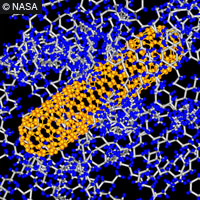Towards an open dialogue on the benefits and risks of nanotechnologies
A European project has developed a set of tools to help support a dialogue between scientists, policy makers and the public about the benefits and potential impacts of nanosciences and nanotechnologies. As the public's ongoing rejection of GMOs (genetically modified organisms) shows, when public trust in a new technology is lost, regaining it is incredibly difficult. Nanotechnologies offer the promise of exciting new advances in a range of fields, from energy and the environment to textiles and medicine, yet there are also questions about the safety of these new technologies. The aim of Nanologue, a project funded under the Sixth Framework Programme (FP6), is to promote an open and honest dialogue between scientists, policy makers and the public about both the potential benefits and pitfalls of nanotechnologies. The project is now drawing to a close. Volker Türk of the Wuppertal Institute in Germany is the Project Coordinator. He outlined the project's main recommendations to CORDIS News. According to Mr Türk, the main problem is that all too often people lump all the nanotechnologies together, so if something goes wrong in one field, all other fields are affected. 'We should be specific that there are different technologies with different risks and benefits,' he says. The project also recommends that project results should be freely available, possibly through a single clearing house which brings together research from a range of different technologies. Finally, the debate needs to be open and honest. 'We should not pretend there are no risks, but we should also note that there are huge opportunities,' comments Mr Türk. During their research, the project partners realised that most people working on nanotechnologies were largely unaware of the ethical implications of their work. 'We realised that there is a lot of discussion about ethics, but it is very academic and the people developing these technologies don't know these issues,' explained Mr Türk. This led the project partners to develop the Nanometer, an online tool which helps researchers and product developers identify areas which could raise ethical, environmental or societal concerns among future consumers. 'We took the essence of what we had learned and boiled it down into 18 questions which give an idea of questions which people could raise,' explains Dr Türk. The questions are divided into seven sections and cover issues such as social benefits, health and the environment, resource requirements, privacy and transparency. At the start of each section, a brief introduction explains why that issue is relevant for nanotechnologies. Each question is clarified by a brief explanation, while a series of links offers users the opportunity to explore the issues in greater depth if they wish. At the end of the survey, a table is generated which summarises the user's answers and highlights areas of potential concern. Users who register with the site can also save the data for future use. The project partners will now promote the tool to the nanotechnology community. Another major outcome of the project is a set of scenarios which look at how nanotechnologies could develop between now and 2015. The cases were developed by experts and are the outcome of variations in key drivers which are likely to influence how the technologies develop and are used in the future. Drivers include the legal and political framework, prices of raw materials, the speed of scientific progress in nanotechnologies and environmental pressures. In each scenario, nanotechnologies have ended up being put to quite different uses, and have varying levels of public acceptance. Now the researchers are hoping to run workshops with decision makers, taking them through the scenarios and helping them understand the possible future impacts of their policies. A play based on the scenarios has also been written; it will receive its public premier at an exhibition in Munich. Looking to the future, Mr Türk hopes to look more closely into the use of nanotechnologies in the energy field. 'We have identified the energy area as having many opportunities, but we need a more detailed assessment of the potential benefits and drawbacks,' he explains. Meanwhile the European Parliament has backed a report calling for more funding in nanotechnologies research, as well as a clarification of the legal and business environment for these technologies. The report also notes that an 'ethical approach' is essential to win public trust.
Countries
Switzerland, Germany, United Kingdom



